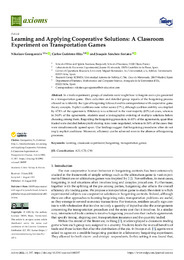Título :
Learning and Applying Cooperative Solutions: A Classroom Experiment on Transportation Games |
Autor :
Georgantzis, Nikolaos 
Gutiérrez-Hita, Carlos 
Sánchez Soriano, Joaquín |
Editor :
MDPI |
Departamento:
Departamentos de la UMH::Estudios Económicos y Financieros |
Fecha de publicación:
2022-08 |
URI :
https://hdl.handle.net/11000/34855 |
Resumen :
In a trade experiment, groups of students were taught how to bargain over a pie generated in a transportation game. Data collection and detailed group reports of the bargaining process allowed us to identify the type of bargaining followed and its correspondence with cooperative game theory concepts. Explicit coalitions were rather scarce (17%), although coalition stability was implied Citation: Georgantzis, N.; GutiérrezHita, C.; Sánchez-Soriano, J. Learning and Applying Cooperative Solutions: AClassroom Experiment on Transportation Games. Axioms 2022, 11, 397. https://doi.org/10.3390/ axioms11080397 Academic Editor: Sidney A. Morris Received: 15 June 2022 Accepted: 1 August 2022 Published: 11 August 2022 Publisher’s Note: MDPI stays neutral with regard to jurisdictional claims in published maps and institutional affiliations. Copyright: © 2022 by the authors. Licensee MDPI, Basel, Switzerland. This article is an open access article distributed under the terms and conditions of the Creative Commons Attribution (CC BY) license (https:// creativecommons.org/licenses/by/ 4.0/). by 47.8% of the agreements. Efficiency was achieved in the vast majority (82%) of cases, whereas in 34.8% of the agreements, students used a lexicographic ordering of multiple solutions before choosing among them. Regarding the bargaining procedure, in 40% of the agreements, quantities traded were decided before profit sharing rules were negotiated, whereas in 16% of the cases they were simultaneously agreed upon. Our findings suggest that bargaining procedures often do not imply explicit coalitions. Moreover, efficiency can be achieved even in the absence of bargaining processes
|
Palabras clave/Materias:
learning
classroom experiment
bargaining
transportation games |
Área de conocimiento :
CDU: Ciencias sociales: Economía: Situación económica. Política económica. Gestión, control y planificación de la economía. Producción. Servicios. Turismo. Precios |
Tipo de documento :
info:eu-repo/semantics/article |
Derechos de acceso:
info:eu-repo/semantics/openAccess
Attribution-NonCommercial-NoDerivatives 4.0 Internacional |
DOI :
https://doi.org/10.3390/ axioms11080397 |
Publicado en:
. Axioms 2022, 11, 397 |
Aparece en las colecciones:
Artículos - Estudios Económicos y Financieros
|
 La licencia se describe como: Atribución-NonComercial-NoDerivada 4.0 Internacional.
La licencia se describe como: Atribución-NonComercial-NoDerivada 4.0 Internacional.
.png)
